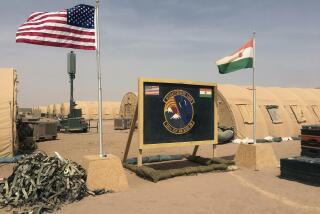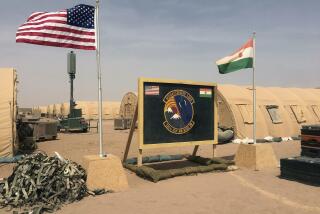150 Marines Withdraw From Liberia to Warships
MONROVIA, Liberia — A 150-strong Marine force withdrew to warships off the Liberian capital’s coast Sunday, ending a significant deployment on the ground after just 11 days and disappointing many Liberians.
The Marines said U.S. troops would be better positioned on the warships to respond to any flare-ups in Liberia’s week-old peace accord, meant to end 14 years of conflict that have claimed more than 150,000 lives.
Liberians, watching U.S. military helicopters whir out of sight in the unannounced departure, spoke fearfully of being deserted.
“They’re forsaking us,” 22-year-old Emmanuel Slawon said as he watched the last U.S. helicopter fly out of Liberia’s main airport.
“We wish they’d stay until peace would come,” Slawon said. “Their presence here puts fear in our fighters -- it makes them think if they carry on hostilities, they’ll be handled by the Americans.”
The Marines’ move came as state radio accused rebels of committing a massacre, quoting one source as saying about 1,000 people had died.
The reports of the massacre in Nimba County, far from Monrovia, could not be immediately confirmed. Nor was it clear when it might have occurred.
A West African peace force that arrived about three weeks ago has helped stop fighting in Monrovia. But clashes persist in the countryside -- sending refugees fleeing.
President Bush put the Marine rapid-reaction force on the ground Aug. 14, under pressure internationally to quell bloodletting in Liberia, a nation founded by freed American slaves with U.S. backing in the 19th century.
Military helicopters carried the Marines back out of Liberia on Sunday, in driving rain.
“Let’s hope they’ll have peace in Liberia,” said one Marine who didn’t give his name, heading for the waiting chopper, its rotors running.
About 100 U.S. troops remain on the ground -- 70 guarding the U.S. Embassy, and 30 acting as liaisons with West African peacekeepers, Lt. Col. Tom Collins told Associated Press as he left.
The decision “reflects the situation on the ground here,” Collins said. “We’re here to support [the West Africans], but we can do it better from the ship.”
More to Read
Sign up for Essential California
The most important California stories and recommendations in your inbox every morning.
You may occasionally receive promotional content from the Los Angeles Times.










